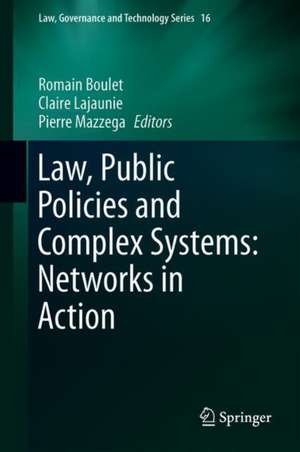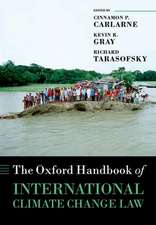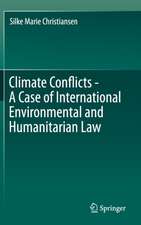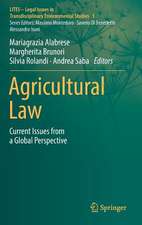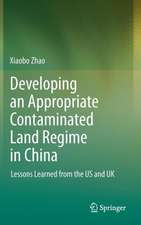Law, Public Policies and Complex Systems: Networks in Action: Law, Governance and Technology Series, cartea 42
Editat de Romain Boulet, Claire Lajaunie, Pierre Mazzegaen Limba Engleză Hardback – 16 mai 2019
Among the subject matter discussed, law as a network of evolving and interactive norms is now a prominent sphere of study. Similarly, public policies are now a topic in their own right, as policy can no longer be examined as a linear process; rather, its study should reflect the complexity of the networks of actors, norms and resources involved, as well as the uncertainty or weak predictability of their direct or indirect impacts.
The book is divided into three maain parts: complexity faced by jurists, complexity in action and public policies, andcomplexity and networks. The main themes examined concern codification, governance, climate change, normative networks, health, water management, use-related conflicts, legal regime conflicts, and the use of indicators.
Din seria Law, Governance and Technology Series
- 18%
 Preț: 950.33 lei
Preț: 950.33 lei - 24%
 Preț: 645.10 lei
Preț: 645.10 lei - 20%
 Preț: 691.09 lei
Preț: 691.09 lei - 20%
 Preț: 574.07 lei
Preț: 574.07 lei - 20%
 Preț: 879.80 lei
Preț: 879.80 lei - 20%
 Preț: 878.75 lei
Preț: 878.75 lei - 18%
 Preț: 1122.56 lei
Preț: 1122.56 lei - 18%
 Preț: 1130.27 lei
Preț: 1130.27 lei - 15%
 Preț: 642.83 lei
Preț: 642.83 lei - 18%
 Preț: 1009.85 lei
Preț: 1009.85 lei - 15%
 Preț: 638.43 lei
Preț: 638.43 lei - 15%
 Preț: 653.14 lei
Preț: 653.14 lei - 18%
 Preț: 950.52 lei
Preț: 950.52 lei - 18%
 Preț: 1115.14 lei
Preț: 1115.14 lei - 18%
 Preț: 949.23 lei
Preț: 949.23 lei - 18%
 Preț: 1124.30 lei
Preț: 1124.30 lei - 18%
 Preț: 1014.76 lei
Preț: 1014.76 lei - 18%
 Preț: 1124.60 lei
Preț: 1124.60 lei - 18%
 Preț: 999.45 lei
Preț: 999.45 lei - 18%
 Preț: 892.42 lei
Preț: 892.42 lei - 15%
 Preț: 640.37 lei
Preț: 640.37 lei - 18%
 Preț: 947.35 lei
Preț: 947.35 lei - 20%
 Preț: 340.32 lei
Preț: 340.32 lei - 18%
 Preț: 1692.20 lei
Preț: 1692.20 lei - 18%
 Preț: 954.93 lei
Preț: 954.93 lei - 24%
 Preț: 789.36 lei
Preț: 789.36 lei -
 Preț: 397.59 lei
Preț: 397.59 lei - 20%
 Preț: 876.57 lei
Preț: 876.57 lei - 20%
 Preț: 652.41 lei
Preț: 652.41 lei - 18%
 Preț: 900.49 lei
Preț: 900.49 lei - 18%
 Preț: 941.50 lei
Preț: 941.50 lei -
 Preț: 392.97 lei
Preț: 392.97 lei -
 Preț: 401.42 lei
Preț: 401.42 lei
Preț: 896.21 lei
Preț vechi: 1092.93 lei
-18% Nou
Puncte Express: 1344
Preț estimativ în valută:
171.53€ • 178.40$ • 143.75£
171.53€ • 178.40$ • 143.75£
Carte tipărită la comandă
Livrare economică 13-27 martie
Preluare comenzi: 021 569.72.76
Specificații
ISBN-13: 9783030115050
ISBN-10: 3030115054
Pagini: 240
Ilustrații: XVII, 280 p. 66 illus., 34 illus. in color.
Dimensiuni: 155 x 235 mm
Greutate: 0.59 kg
Ediția:1st ed. 2019
Editura: Springer International Publishing
Colecția Springer
Seria Law, Governance and Technology Series
Locul publicării:Cham, Switzerland
ISBN-10: 3030115054
Pagini: 240
Ilustrații: XVII, 280 p. 66 illus., 34 illus. in color.
Dimensiuni: 155 x 235 mm
Greutate: 0.59 kg
Ediția:1st ed. 2019
Editura: Springer International Publishing
Colecția Springer
Seria Law, Governance and Technology Series
Locul publicării:Cham, Switzerland
Cuprins
Public Policies, Law, Complexities and Networks.- Part I Complexity Faced by Jurists.- Codification, Between Legal Complexity and Computer Science Agility.- Organizational Consciousness Versus Artificial Consciousness.- The Entity-Process Framework for Integrated Agent-Based Modeling of Social-Ecological Systems.- Part II Complexity in Action and Policy Analysis.- An Interdisciplinary Study of Leptospirosis Surveillance Systems in Three Regencies of East Java, Indonesia.- Complexity of Scenarios of Future Health: Integrating Policies and Laws.- Architectural Pattern for Health Forecasting, Surveillance and Early Warning Systems.- Water Management and Development: The Limits of Coordination.- Formal Analysis of the Conflictive Play of Actors Regarding the Building of a Dam.- Part III Complexity and Networks.- Exploiting the Web of Law.- Environmental and Trade Regimes: Comparison of Hypergraphs Modeling the Ratifications of UN Multilateral Treaties.- How to Compare Bundles ofNational Environmental and Development Indexes?.- Network Theory and Legal Information “for” Reality: A Triple Support for Deliberation, Decision Making, and Legal Expertise.
Notă biografică
Romain Boulet is Doctor in mathematics and associate professor at the iaelyon School of Management and is a member of the Magellan Research Center in Lyon, France. His research areas include graph theory (especially algebraic graph theory) and network analysis, with a particular interest in interdisciplinary collaboration. He has focused on the analysis of legal networks and organized workshops on complexity and public policy.
Claire Lajaunie is Doctor of Law, HDR-accreditation to supervise research- (Aix-Marseille University, France). Researcher at Inserm, she is a Board Member of the International Multidisciplinary Thematic Network "Biodiversity, Health and Societies in Southeast Asia" (Thailand). She is working on Global Environmental Law and public policies, their links with regulation regarding health (infectious diseases) and ethical issues. She is currently involved in research projects focusing on Southeast Asia and she is particularly interested in the relationship between environmental law, ecology and rural development. She is also Affiliate Researcherat the Strathclyde Centre for Environmental Law and Governance, University of Strathclyde, Glasgow,Scotland.
Pierre Mazzega is Doctor in earth observation from space, Engineer in geophysics, HDR-accreditation to supervise research- (Toulouse University, France). Senior scientist at CNRS in the Geosciences Environment Toulouse lab (France), he is developing research on the modelling of environmental Law, policy and governance complex systems, and in the nonlinear (in situ & remote sensing; quantitative and qualitative) data analysis and assimilation in models. He is also Affiliate Researcher the Strathclyde Centre for Environmental Law and Governance, University of Strathclyde, Glasgow, Scotland.
Claire Lajaunie is Doctor of Law, HDR-accreditation to supervise research- (Aix-Marseille University, France). Researcher at Inserm, she is a Board Member of the International Multidisciplinary Thematic Network "Biodiversity, Health and Societies in Southeast Asia" (Thailand). She is working on Global Environmental Law and public policies, their links with regulation regarding health (infectious diseases) and ethical issues. She is currently involved in research projects focusing on Southeast Asia and she is particularly interested in the relationship between environmental law, ecology and rural development. She is also Affiliate Researcherat the Strathclyde Centre for Environmental Law and Governance, University of Strathclyde, Glasgow,Scotland.
Pierre Mazzega is Doctor in earth observation from space, Engineer in geophysics, HDR-accreditation to supervise research- (Toulouse University, France). Senior scientist at CNRS in the Geosciences Environment Toulouse lab (France), he is developing research on the modelling of environmental Law, policy and governance complex systems, and in the nonlinear (in situ & remote sensing; quantitative and qualitative) data analysis and assimilation in models. He is also Affiliate Researcher the Strathclyde Centre for Environmental Law and Governance, University of Strathclyde, Glasgow, Scotland.
Textul de pe ultima copertă
This book investigates how various scientific communities – e.g. legal scientists, political scientists, sociologists, mathematicians, and computer scientists – study law and public policies, which are portrayed here as complex systems. Today, research on law and public policies is rapidly developing at the international level, relying heavily on modeling that employs innovative methods for concrete implementation.
Among the subject matter discussed, law as a network of evolving and interactive norms is now a prominent sphere of study. Similarly, public policies are now a topic in their own right, as policy can no longer be examined as a linear process; rather, its study should reflect the complexity of the networks of actors, norms and resources involved, as well as the uncertainty or weak predictability of their direct or indirect impacts.
The book is divided into three main parts: complexity faced by jurists, complexity in action and public policies, and complexity and networks. The main themes examined concern codification, governance, climate change, normative networks, health, water management, use-related conflicts, legal regime conflicts, and the use of indicators.
Among the subject matter discussed, law as a network of evolving and interactive norms is now a prominent sphere of study. Similarly, public policies are now a topic in their own right, as policy can no longer be examined as a linear process; rather, its study should reflect the complexity of the networks of actors, norms and resources involved, as well as the uncertainty or weak predictability of their direct or indirect impacts.
The book is divided into three main parts: complexity faced by jurists, complexity in action and public policies, and complexity and networks. The main themes examined concern codification, governance, climate change, normative networks, health, water management, use-related conflicts, legal regime conflicts, and the use of indicators.
Caracteristici
Presents international, cutting-edge research on governance and public policies Offers an interdisciplinary framework that links law, public policies, mathematics, and the computer sciences Highlights innovative approaches to law in context
